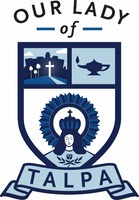The curriculum at archdiocesan Catholic schools integrates the mission of Christ to teach the Gospel
message to all. The archbishop and archdiocese are committed to providing strong academic
experiences for students in school communities that reflect two purposes: the teaching mission of the
Church and the need to educate youth for life in a way that relies on academic skills and requires sound
preparation.
The curriculum consists of all learning experiences that are planned and organized under the
principal's leadership, implementing the school's educational goals in a manner that reflects a
commitment to Catholic teachings. The curriculum must be consistent with the philosophy of the
school, educational policies of the archdiocese, and requirements of the applicable sections of the
California Education Code. The commitment to ongoing academic excellence, personal growth,
leadership, and service as components of Catholic identity extends to all aspects of the academic
program.
The curriculum in elementary schools and high schools is planned at each school to meet these overall
objectives and the particular needs of the individual school community. The Department of Catholic
Schools provides support for curriculum matters. In parish elementary schools and high schools, the
pastor and principal consult on these matters. The archdiocesan high school curriculum is coordinated
by the principal with senior academic and administration staff. While the principal may raise
curriculum issues with consultative school boards and groups, the principal reserves responsibility for
curriculum matters.
Our Lady of Talpa School’s curriculum follows Archdiocesan and California Common Core State Standards and is implemented daily by qualified and committed faculty and staff. We offer a student-centered, comprehensive program that utilizes age-appropriate methods to meet our students’ needs.
We provide a challenging, comprehensive, and relevant curriculum for each student that fulfills the school’s mission and philosophy, strengthens Catholic identity, and results in achievement of our School-wide Learning Expectations (SLEs).
Students receive instruction in Religion, Math, Language Arts (Reading, Writing, English, and Spelling), Social Studies, and Science. Students receive weekly instruction in Music, Art, Physical Education, and technology.
Superkids is a comprehensive English language arts curriculum crafted for grades K–2 using evidence-based literacy practices. This proven-effective program follows a unique systematic and explicit instructional path through engaging, increasingly complex text. Superkids teaches all aspects of reading with a focus on the alphabetic principle. This phonics-based, highly developmentally appropriate approach is exactly what young children need.
Used in grades 3-8, Achieve3000 Literacy’s differentiated content and instruction accelerates learning growth for all students. It is proven to double and even triple expected reading (Lexile) gains in a single school year. Differentiated instruction is the process of adapting instruction to meet the needs of each individual student. It starts with getting to know your students, their interests, and abilities. It ends with watching them engage, learn, and grow.
McGraw-Hill My Math Learning Solution, used in TK, provides an easy and flexible way to diagnose and fill gaps in understanding. It offers best-in-class resources and instructional strategies. Actionable data personalizes learning to accelerate instruction, target each student’s learning, and ensure algebra readiness.
Reveal Math, used in grades K-8, is a complete core math program built on contemporary academic research and designed so all students can succeed in mathematics. Derived from the latest research on how students learn best, Reveal Math is strategically designed to fuel active student engagement and deepen conceptual understanding. This coherent, vertically aligned K–12 core math solution will help uncover the mathematician in every student through productive struggle, rich tasks, inquiry opportunities, and mathematical discourse.
STEMscopes, used in grades TK-8, is a comprehensive suite of results-oriented STEM curriculum and professional development solutions used by more than 8 million students and 600,000 teachers across all 50 states. Created by educators for educators, STEMscopes is highly adaptable, affordable, and supports instruction in any kind of learning environment. STEMscopes was developed by Accelerate Learning Inc. in partnership with Rice University.
TCI social studies programs are used in grades 6-8. TCI’s curriculum resources and programs support the needs of students and educators with an easy-to-implement, interactive curriculum that is comprehensive and promotes blended learning methods. TCI’s social studies curriculum has been developed to align with state-specific standards. Blended learning materials utilize digital resources to simplify planning and preparation for teachers.
Our Lady of Talpa School also utilizes adaptive software to further support students at different academic levels.
Smarty Ants builds foundational reading skills in an interactive and adaptive learning environment designed to instill a love of reading for students in TK-2. "Coach", their personal ant guide, leads students through animated lessons and activities while providing encouragement along the way.
DreamBox, used in TK, is more than a learning tool, it’s a math program that intelligently adapts to each child, letting them drive their own learning while giving parents and teachers in-the-moment data and valuable insights to ensure success.
Redbird Mathematics offers rigorous, adaptive, and personalized math instruction with integrated STEM themes and digital project-based learning for grades K-7. Redbird Mathematics provides students with a richly personalized learning path, delivering precisely what each individual needs to build strong algebra readiness skills and accelerate learning forward.
ALEKS (Assessment and Learning in Knowledge Spaces) is a web-based, artificially intelligent assessment and learning system used in grades 6–8. ALEKS uses adaptive questioning to quickly and accurately determine exactly what topics a student knows and doesn’t know in a course. ALEKS then instructs each student on the topics they are most ready to learn. ALEKS is purposefully designed to help educators: identify instructional gaps, personalize learning paths, and track the progress of student learning and mastery.
